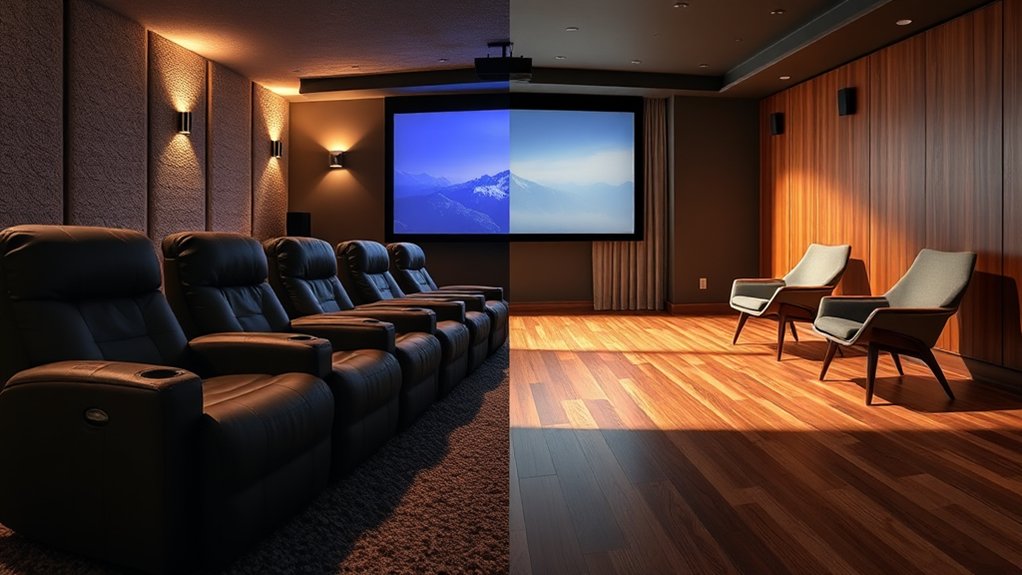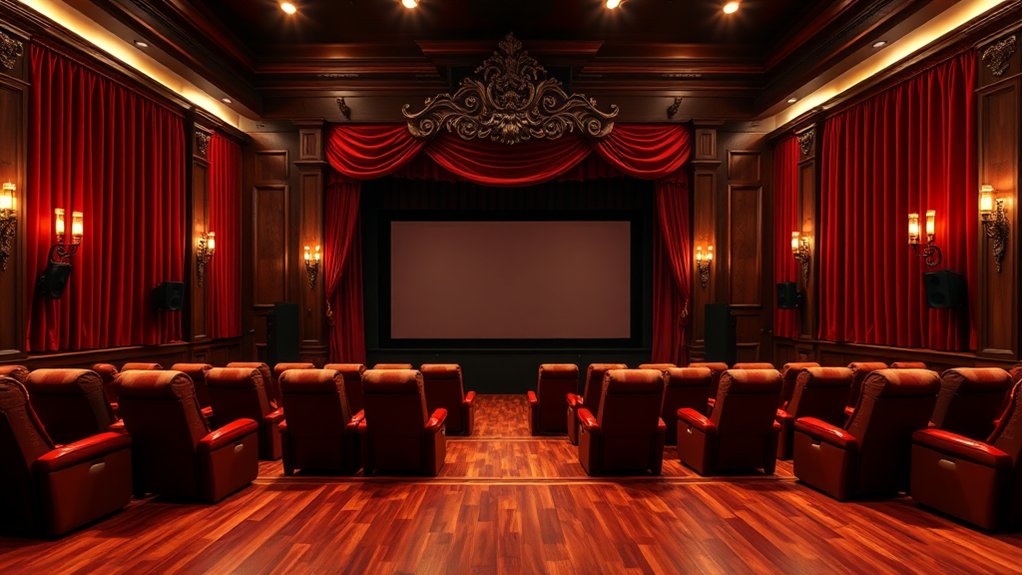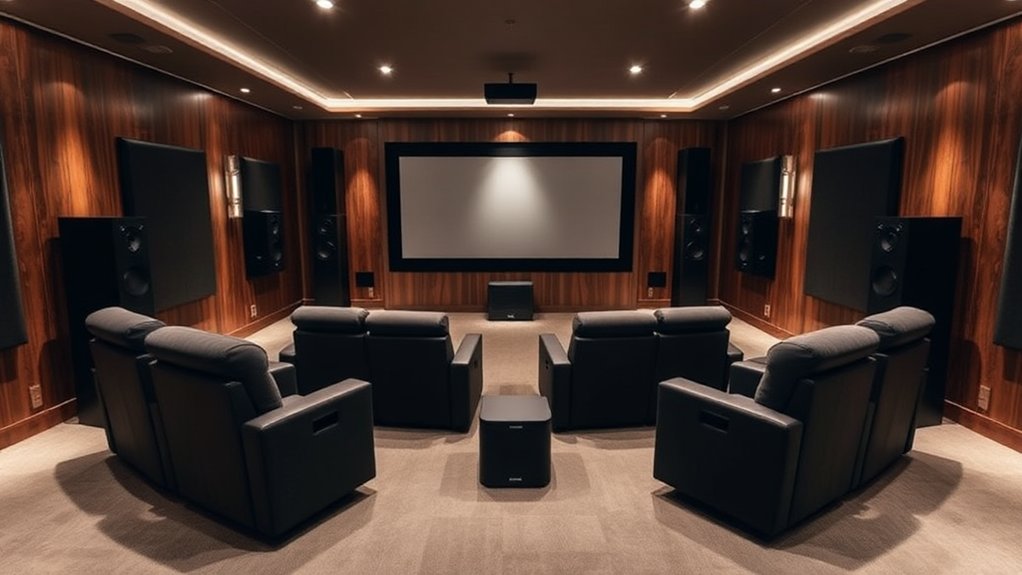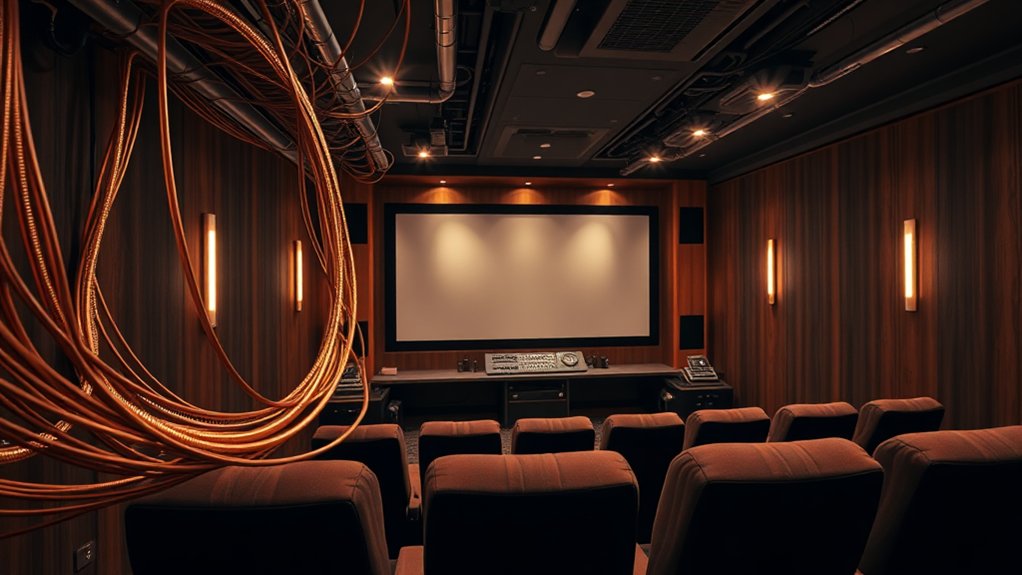When choosing between carpet and hardwood for your home theater, consider how each affects sound quality and comfort. Carpet absorbs sound, creating a cozy atmosphere perfect for long movie marathons. Conversely, hardwood can reflect sound, making voices harder to understand (not ideal during suspenseful scenes). Plus, think about your budget and how much maintenance you’re willing to handle. Although carpet’s installation is typically cheaper, hardwood offers timeless elegance. Curious about which option suits your style?
Key Highlights
- Consider carpet for superior sound absorption, enhancing the clarity of dialogues and music in your home theater.
- Choose hardwood for a bright auditory experience, but be aware it may result in more reverberations.
- Evaluate comfort: carpet provides a soft, warm surface ideal for long viewing sessions, while hardwood feels cooler underfoot.
- Factor in maintenance: carpet requires regular vacuuming and deep cleaning, while hardwood simply needs sweeping or mopping.
- Assess your budget and installation costs, as carpet is generally more affordable than solid hardwood flooring.
Acoustic Performance: Enhancing Sound Quality
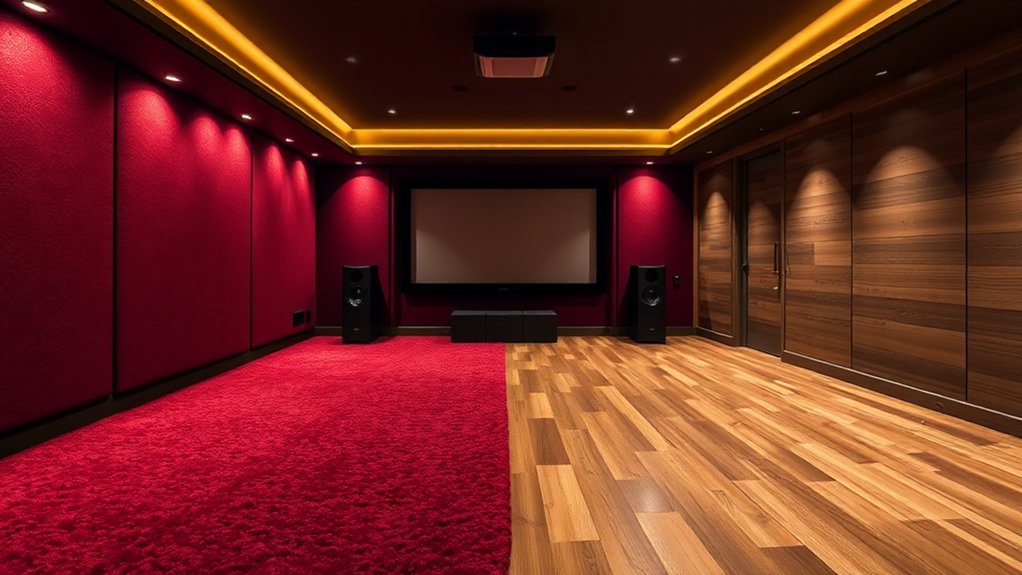
In regard to improving sound quality in your home theater, the choice between carpet and hardwood can make a world of difference.
Carpet boasts a high noise reduction coefficient (NRC) of up to 0.9, meaning it effectively absorbs sound, minimizing echo and muddiness. Conversely, hardwood tends to reflect sound, causing a bright and sometimes overwhelming auditory experience. Sound Absorption plays a crucial role in creating a conducive environment for enjoying your favorite films and music with clarity. Moreover, the right carpet material is important in ensuring durability and optimal acoustic performance within the space.
Imagine trying to catch every subtle detail of a film amidst the clamor of bouncing sound waves! By opting for carpet, especially when paired with appropriate padding, you create a space where dialogue is clear and sound effects resonate without distortion.
Plus, if you’re not ready to commit to full carpeting, strategic rugs can still greatly improve your listening experience.
Comfort and Warmth: Creating a Cozy Atmosphere
Creating a cozy atmosphere in your home theater is more than just picking the right movie; it’s about how that space feels when you’re unwinding with friends or family.
Choosing carpet adds a soft, cushioned surface that invites you to sink in and stay awhile. Picture indulging in a long movie marathon without the fatigue of hard flooring beneath you. Furthermore, carpet acts as an insulator, trapping heat and creating a warm environment, especially appreciated during those chilly winter nights. Its ability to absorb sound makes the space quieter, enhancing your viewing experience—who wants to hear background noise when they’re engrossed in a film? Additionally, the sound absorption properties of carpet reduce reverberations, allowing for increased voice clarity during dialogue-heavy scenes. Notably, durable hardwood flooring can last generations, but choosing carpet can provide immediate comfort for movie enthusiasts.
Durability and Maintenance: Long-Term Considerations
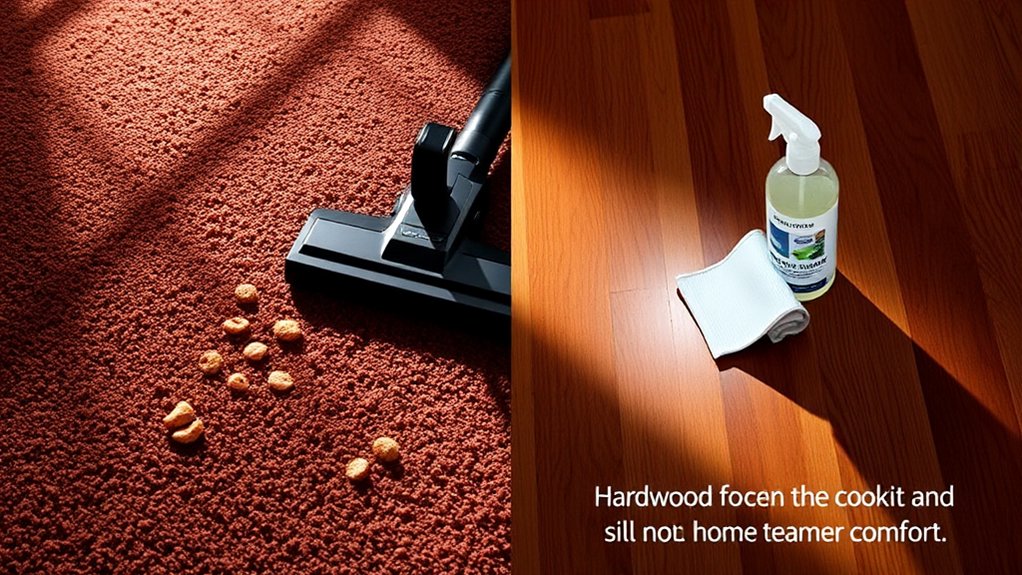
As comfort and warmth set the mood for your cinematic experience, durability and maintenance play a significant role in the long-term enjoyment of your home theater.
Hardwood floors can last decades with proper care, whereas carpets typically need replacing every 5-15 years. Imagine your home theater enduring countless movie marathons; hardwood’s resistance to wear means it can handle that traffic without losing its charm. Additionally, hardwood’s longer lifespan ensures you won’t have to worry about frequent replacements, allowing you to focus more on watching movies rather than maintaining your flooring.
Although it might get a scratch here and there, you can refinish it—something carpet can’t boast. Cleaning’s a breeze with hardwood too; just a quick sweep or mop.
Carpets? They require vacuuming and a good deep clean. In the end, investing in hardwood might save you money and headaches in the long run—unless you’re planning an annual carpet replacement party!
Aesthetic and Design Flexibility: Finding Your Style
In relation to designing your home theater, you might find that aesthetic choices truly shape the atmosphere as much as the equipment you choose.
Hardwood offers that luxurious touch! Its natural grain and various finishes can give your space a timeless elegance, whereas its neutral tones permit easy integration with different decor styles.
Conversely, carpets bring a literal softer touch—think of the cozy vibes of a plush, dark carpet in a horror-themed setup that wraps you in comfort during those long movie marathons.
Plus, with endless textures, colors, and patterns to choose from, you can really customize the ambiance.
In the end, whether you choose the sophistication of hardwood or the warmth of carpet, your style will shine through.
Installation and Cost Considerations: Budgeting Your Space
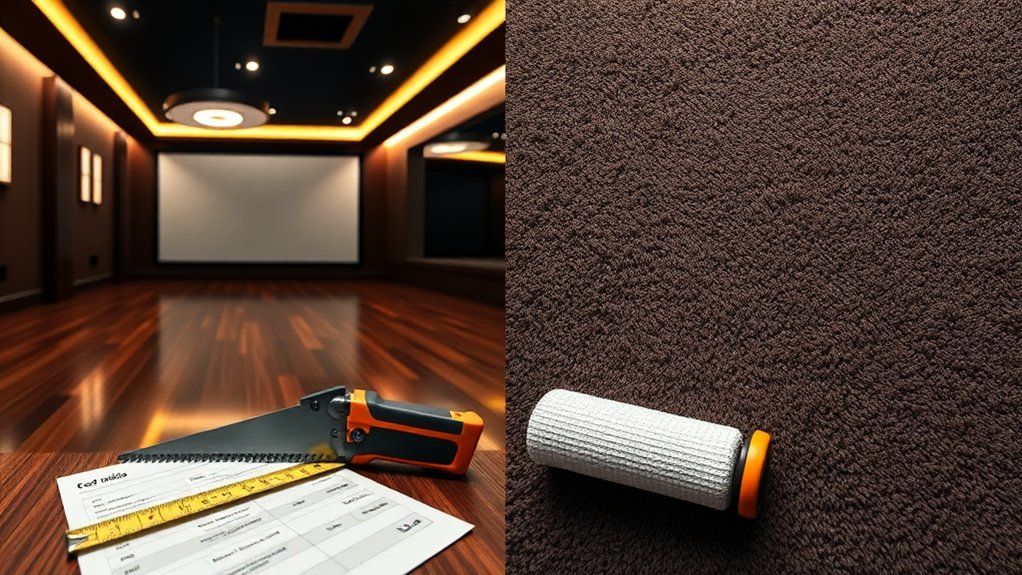
As you select the perfect flooring for your home theater, you’ll find that installation and cost play significant roles in your decision-making process.
Carpet usually ranks as the more budget-friendly option, with installation costs ranging from $2 to $8 per square foot. Conversely, solid hardwood can escalate costs to between $11 and $25 per square foot—yikes!
Engineered hardwood offers a compromise, costing between $7 and $15 per square foot, during the maintenance of quality.
Keep in mind that hardwood requires meticulous installation, which can inflate labor costs. Plus, whereas carpet may need frequent replacement every 5 to 15 years, hardwood can last 30 to 50+ years, making it essential to weigh upfront costs against long-term value when budgeting your dream space.
Practicality and Usage: Tailoring to Your Needs
Choosing the right flooring for your home theater is about more than just aesthetics; it’s about how it fits your lifestyle and the experience you want to create.
If you enjoy cozy movie nights, carpet offers a soft, warm surface that cushions your feet and absorbs sound, enhancing audio clarity. It’s perfect for long sessions when comfort matters.
On the other hand, if durability and easier maintenance are your priorities, hardwood may be the way to go. Although hardwood is easier to clean and can last for generations, its hard surface mightn’t be as forgiving during family movie marathons.
In the end, think about who’ll be using your theater, and how much maintenance you’re willing to handle—what’s your ideal movie-watching environment?
Making the Final Decision: Weighing the Pros and Cons
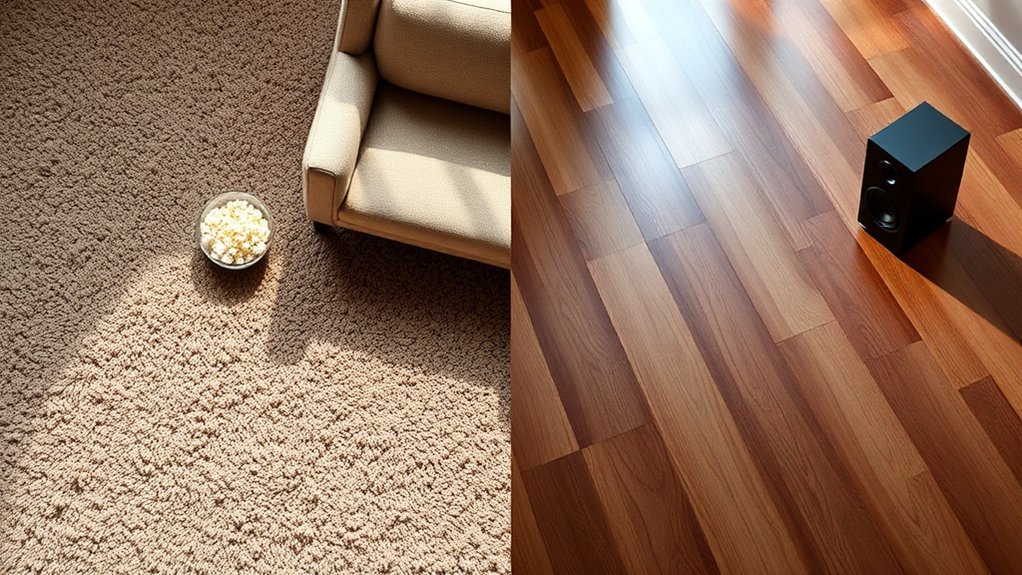
As you’re contemplating the best flooring for your home theater, it helps to weigh the pros and cons of both options carefully.
Hardwood offers a luxurious, timeless appeal, easily enhancing the room’s sophistication, but don’t forget about its tendency to reflect sound, which might create echo issues.
Conversely, carpet, with its sound-absorbing qualities, provides that cozy feel perfect for movie marathons, though it may need more upkeep and can stain like your uncle’s shirt at the last family BBQ.
Consider your budget, as hardwood might cost more upfront but can add long-term value.
In the end, balance your aesthetic desires with practical sound and maintenance needs—because what’s a home theater without great sound, right?
Frequently Asked Questions
How Do I Clean Carpet Stains Effectively?
To clean carpet stains effectively, act quickly. Blot spills with a clean cloth, use mild cleaning solutions like vinegar or soapy water, and avoid rubbing to prevent damage. Test solutions first to avoid discoloration.
What Is the Best Carpet Material for Home Theaters?
For home theaters, you’ll want carpet materials like wool for superior sound absorption or nylon for durability. Low pile options reduce dust, whereas thicker carpets improve comfort during long movie sessions. Choose wisely for ideal acoustic performance!
Can Hardwood Floors Work in a Basement Home Theater?
Hardwood floors typically aren’t ideal for basement home theaters because of dampness risks. If you control humidity, engineered hardwood might work, but consider waterproof options like vinyl or durable carpet for better comfort and acoustics.
How Often Should I Replace Carpet in a Home Theater?
You should plan to replace carpet in your home theater every 5 to 7 years, especially if it’s in a high-traffic area. Regular maintenance can extend its lifespan, but wear and stains signal when it’s time.
Do Area Rugs Help With Sound Quality on Hardwood Floors?
Yes, area rugs greatly improve sound quality on hardwood floors. They absorb sound vibrations, reduce echoes, and elevate clarity, creating a more enjoyable audio experience during movies and music. You’ll notice the difference in acoustics.

